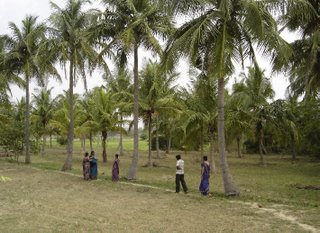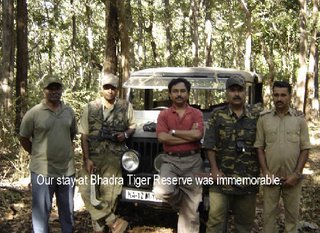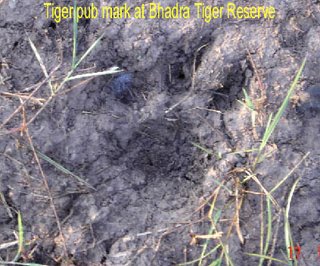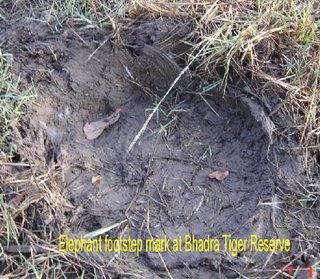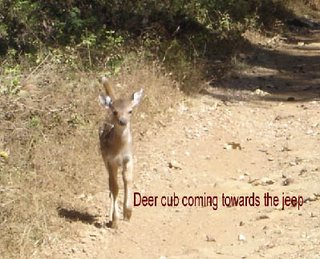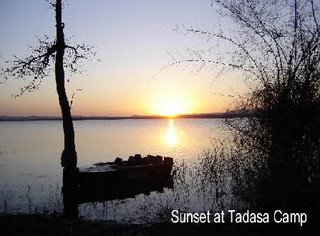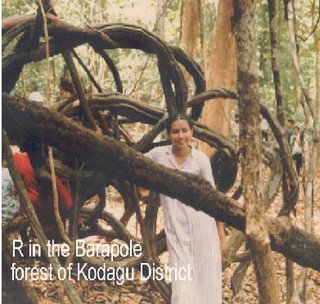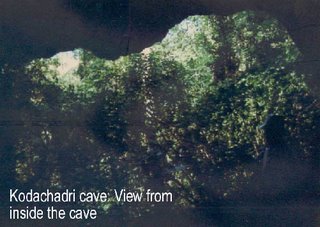I am glad, my childhood the had best of the rural experiences and I always regret, my children can never have that.
Both my parents were from villages and since my father moved to town to look for a town job, family also moved with him. We as small children used to go to village as often as we could. But our attachment was more to our mother's village. Our father and his brothers had seperated and they lived on their own with their families. I donot remember my grandfather (father's father) but my grandmother stayed with us till she breathed her last.
It was totally a different story with my mother's village- a small village of about 100 households. My grandfather and grandmother were quite welloff and they had a lot of lands and so many cattle which I was never able to count. They had a big cattle shed for cows and bullocks and seperate pens for sheep and goat. They had well built bullocks for carts and ploughing and innumerable poultry birds.
After we started going to school, we were waiting for our summer holidays or any holiday for that matter, to visit that village. The house had so many mysteries and dark attics and big granaries all around. I was always afraid to venture in to the attic but was always eager to explore. Whenever my grandmother went, I used to follow her.
She had a huge wooden trunk which was always locked and would never allow us to peep into it. There were long swords in the house which they cleaned them and worshipped them on Ayudha Puja. They were telling that their ancestors were soldiers in an unknown army. The swords were so huge and heavy, we children could never lift them with both our hands.
Here I am with my grandfather, grandmother, brother and aunts. I donot know another grandmother who is standing. Can you guess who I am in this picture?
Well, I am with my grandmother who is sitting to the left. I had a long hair and my mother has decorated it with flowers! First hair of the kids will not be cut until a ritual called `Dyavara' was done. Since my Dyavara was not done I had a long hair.
href="http://photos1.blogger.com/blogger/5051/2053/1600/siddaghatta3.jpg">

The village was about 2-3 kms from the bus road and we after getting down from the bus had to walk in the mud route. I remember very well, there was a tamarind tree on the way and I was always afraid to look at it. It was huge and people always said some ghost stories about that tree. There was a community graveyard on the way to our lands. I was always afraid to pass through that road. My grandfather after his death was buried there. After that I got courage and pacified myself saying that if any ghost comes to threaten me, my grandfather ghost would come to help me!
Here I am with my brother, mother and aunt (my mother's sister). Hope you have no problem in recognising me!
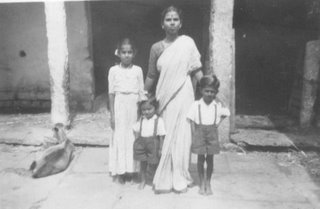
All the cattle are left out to graze and there was one person to look after them. Sometimes if he does not turn up for one or the other reason we cousins were asked to herd them for grazing. We were having a tough time keeping them together! Usually bullocks are not left out on their own. They needed to be taken everyday morning and evening to water pond to allow them to drink water and quench their thirst. Some bullocks were dangerous and were not allowing strangers near them.
We used to climb trees, swim in muddy waters, go for catching fish. There was so much milk in the house and there were no milk collecting centres or dairy at that time in the village. Our grandmother always had a `bigger hand' and we townsfolk enjoyed milk, butter and ghee as if we had never tasted it before.
Well,
the story has changed now and so is the family. One day my father went to the village to settle a dispute and I also went with him. My mother is the eldest and she has three brothes and two sisters. That day the property was to be distributed among three brothers. By that time my grandfather had died. My father was the person who needed to settle things amicably. I witnessed a scene which I had never seen before. The three brothers quarrelled, argued, scolded and literally fought among themselves. My father had a tough time and finally the settlement was made.
Now also I visit the village whenever I get a chance. I am still nostalgic about it, but the eagerness is not there. Now there are three houses where three of my uncles live seperately with their children. Actually four houses, one son of my elder uncle has seperated and he has a house of his own now. There is no intimacy , no affection among brothers. The old house is till there, but there are no mysteries in it now. The heavy and long swords have disappeared (probably sold for some money). My grandmother's old trunk has vanished. No attics and nothing to explore there now. My grandmother came out of the village and stayed with us till she died. She was a powerful lady, who fed many people. During her last days she insisted on returning to her house and die there and she had a miserable end. Fortunately my mother was with her when she closed her eyes.
My children love to go to that village. They like to swim in the well which my grandfather built during 1962. It is almost 60 feet deep and has water till its brim almost throughtout the year. You can see my son and daughter swimming in that well. I also join them, since I can never remove my memories from that village.
This is a recent photo. My daughter had already learnt swimming. She jumps as my wife watches.
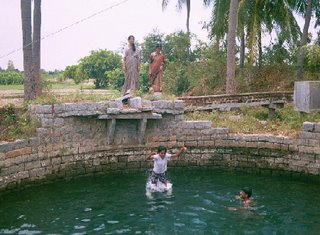
My son (on the leftside) is very fond of swimming. He likes this village very much because of this open well.

Here I have joined my kids. My brother and his kids watch me as I dive.
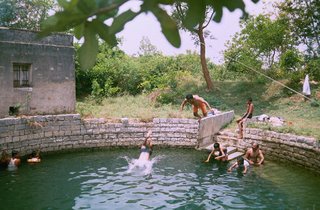
A view of the farmlands of the village taken during a recent visit.
